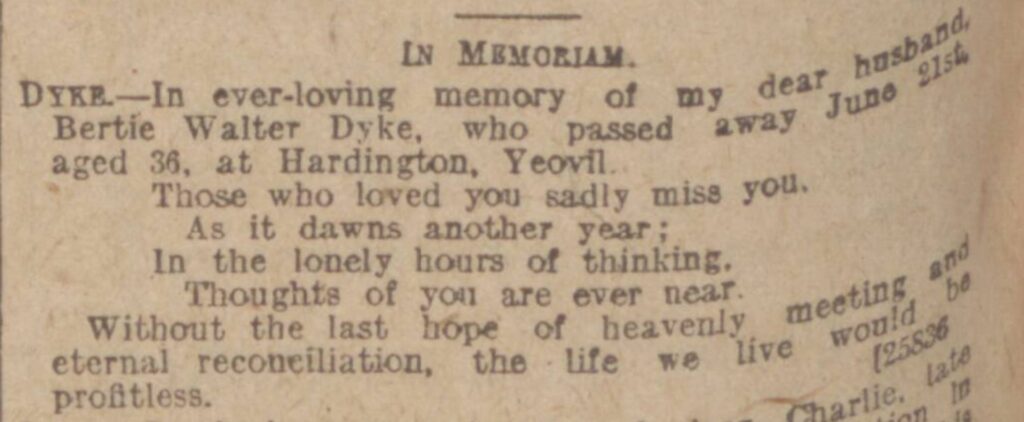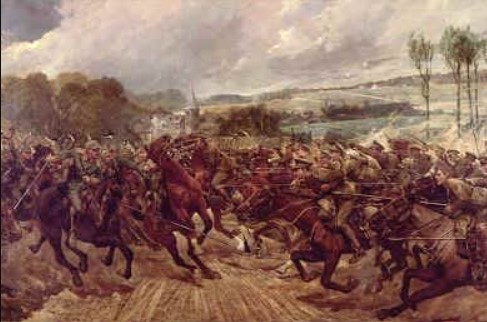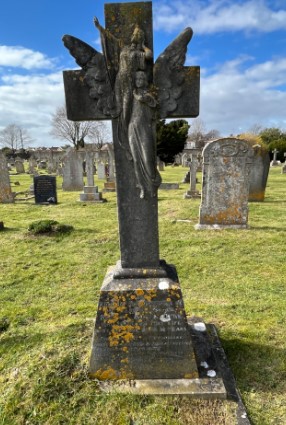
The In Memoriam notice shown above appeared in the Western Gazette newspaper on 23 June 1922. It contains conventional verse testifying to a wife missing her husband, but also includes a religious message that without the hope of meeting again in heaven, life would be meaningless.
The death certificate shown below shows that Bertie Walter Dyke died at Hardington Mandeville on 21 June 1921 from pulmonary tuberculosis with his wife, Lucy, was at his side. Dr Frank Collar of West Coker certified the cause of death.

The 1921 census taken just two days before Bertie died shows Bertie and Lucy’s ages and places of birth.

This article explores Bertie’s life and attempts to explain how he came to spend his final days at Hardington.
Childhood
Bertie Walter Dyke was born in 1883 at Upton Noble.[1] His father, William, was a farmer, and his mother, Jane, was the daughter of George Hare, a London grocer and clerk. They married at St George’s Church, Hanover Square, on 6 March 1876. As his father’s address was Milborne Port at the time, it is unclear how they met.
After Jane’s marriage, her parents relocated to Upton Noble, where they lived in Church Street. Bertie would have known them as his grandfather passed away in 1893 and his grandmother in 1915. Their tales of London life would have starkly contrasted with Bertie’s experiences in the Somerset countryside.
Bertie’s father, William, had grown up on a 200-acre farm at Wincanton but could not replicate his father’s success. Although initially, he appeared to be on an upward trajectory, by the 1890s, he was struggling. After marrying, he briefly lived at North Brewham, then from about 1878 to 1890, he farmed 34 acres in Upton Noble, followed by 91 acres at Neighbourne Farm in Ashwick until 1892. Unfortunately, he then experienced a downturn and became a farm bailiff at Bishops Cannings near Devizes.[2]
Death of mother
While the family was at Bishops Cannings, Bertie’s mother died on 6 August 1900 at the age of 47.[3] Her death broke up the family. Her two youngest daughters, Beatrice and Rosabel, moved in with their widowed grandmother, Sarah Hare, at Upton Noble. Bertie, the youngest son, probably began working in a shop, although he has not been found in the 1901 census.
Early career
By April 1911, Bertie was one of eighteen draper’s shop assistants living at 8 New Fillebrook Road, Leyton, in Essex.
First World War
Bertie served with the Lacers for part of the First World War but later left the regiment, presumably due to an injury.
By July 1917, Bertie was the manager of the Church Institute at Bovington Camp in Dorset. Although his position suggests that he held strong religious convictions, his role may have been more of a caretaker. He was still at the institute in January 1920 when he advertised his evening dress for sale.[4]
Five days after the armistice, he made his will—likely a sign that he anticipated he did not have long to live.[5]
Marriage
On 9 July 1917, Bertie married Lucy Burt at Wyke Regis parish church. Lucy was 30, and Bertie was four years older. A soldier and his wife acted as witnesses to their marriage.
Born on 28 June 1887 at Puncknowle, Lucy was the daughter of Thomas Burt, a farm labourer from Pendomer. The 1911 census recorded her as a cook at St Mary’s Vicarage, Dorchester, and she probably continued in a similar role at Wyke Regis.
Hardington
By June 1921, Bertie and Lucy lived in Barry Lane, Hardington, without recorded occupations. The property was probably St Bernards Cottage, owned by Ellen Fudge.
Since Bertie and Lucy had no personal ties to Hardington, it is possible that Lucy’s father recommended it as a good place for them to spend their final time together.
Death
Bertie’s time at the cottage was short-lived; he died there on June 21, 1921, at the age of 37, with his beloved Lucy by his side. According to the death certificate, the cause of death, as certified by Dr. Frank Collar of West Coker, was pulmonary tuberculosis. By his will, he bequeathed his entire estate, valued at £368-7s-9d, to Lucy.[6]
Lucy’s later life
Lucy may have remained at Hardington until 1924, as Ellen Fudge advertised the cottage as available to let that year.[7]
One year after Bertie’s death, Lucy placed an In Memoriam notice in the Western Gazette adopting four lines of verse to express how she missed him and adding that life would be “profitless” without the hope of reuniting in Heaven.[8]
However, as time passed, her grief lessened, and she moved to Dorset, where she met Reginald Alfred Samways, whom she married in 1925. In his youth, Reginald had been a farm labourer like her father, but after the First World War, he found employment with Dorchester Corporation as a dustman. Their marriage lasted 43 years until Lucy passed away in 1968 at the age of 81.
References
[1] Civil registration birth index: birth registered Shepton Mallet Q3 1883-mother’s maiden name Hare.
[2] 1891 census.
[3] Civil registration death index; national probate register (her admon was not granted until 1919).
[4] Western Gazette, 30 January 1920, p.7. His earlier advertisement of 6 June 1919, where he set a price of £4 or a lady’s bicycle in exchange, had presumably failed to secure a sale.
[5] The will of Bertie Walter Dyke, dated 16 November 1916, proved at Taunton on 29 July 1921.
[6] The will of Bertie Walter Dyke, dated 16 November 1916, proved at Taunton on 29 July 1921.
[7] Western Gazette, 21 November 1924, p.6.
[8] Western Gazette, 23 June 1922, p.12.


